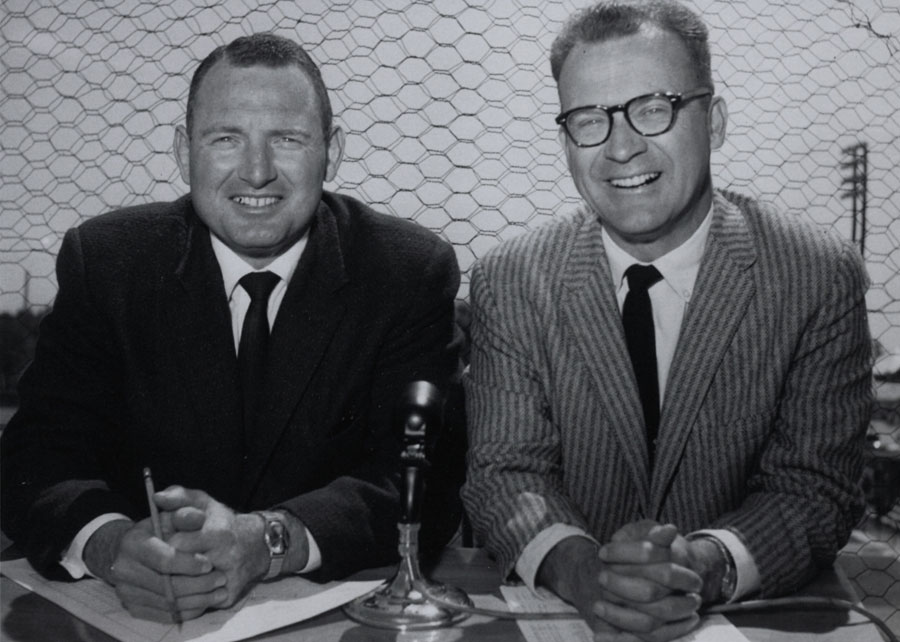
 THE DETROIT TIGERS BROADCASTING NETWORK WKMH 1310 (1962)
THE DETROIT TIGERS BROADCASTING NETWORK WKMH 1310 (1962)
![]()
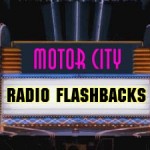 From the MCRFB radio scrapbook: 1947
From the MCRFB radio scrapbook: 1947
Dearborn Station Gets Army Games
 DETROIT, October 11 — A deal for the Army football games has been signed by WKMH, local AM station, with CKLW, the regular Mutual outlet, taking the Notre Dame games instead. WKMH is a 1,000-watt suburban station in Dearborn, Mich., but has good metropolitan coverage and outranks the three older local radio stations, WEXL, WJBK and WJLB, all 250-watters.
DETROIT, October 11 — A deal for the Army football games has been signed by WKMH, local AM station, with CKLW, the regular Mutual outlet, taking the Notre Dame games instead. WKMH is a 1,000-watt suburban station in Dearborn, Mich., but has good metropolitan coverage and outranks the three older local radio stations, WEXL, WJBK and WJLB, all 250-watters.
WKMH is cutting out the Mutual identifications on Ted Husing’s broadcasts and making no attempt to identify its program with the network, which is normally carried by CKLW in Detroit and its surrounding listening areas.
(Information and news source: Billboard; October 11, 1947).
![]()
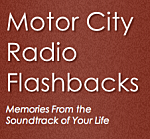 From the MCRFB NEWS archive: 1959
From the MCRFB NEWS archive: 1959
Newest Distrib-Paid LP Spin Plan Spark Solid Local Dealer Aids

DETROIT — A new trend is evincing itself in the broadcast field, which — if adopted on a national scale — could conceivably lessen the evils of deejay payola. It’s the official pay-for-play plan, whereby stations sell record distributors time to spin and plug a specific recorded disk.
Pay-for-plays programs of various types have been conducted successfully by such key stations as WITH, Baltimore and KDAY, Los Angeles, with considerable success, and one of the most elaborate pay-for-spins operations is currently shaping up in Detroit, where station WJBK has been conducting a “Sound Special” promotion on singles (offering one play per-hour per week for $300.00) for the past few months, and now WKMH is preparing a similar promotion showcase for albums.
Album Of The Week
The WKMH promotion, tagged “Album Of The Week,” guarantees distributors 114 plays per week at a cost of $350 per week for six weeks. The plan will be set up with eight local disk distributors on a rotating basis, covering a period of 48 weeks. Each distributor will have one of his albums featured every eight weeks. Distributor must purchase the plan for the entire 48-week period.
Choice of album featured each week will be left to the distributors. However, L.P.’s must “meet the requirements of WKMH’s ‘Good Music Policy’.”
Each “Album Of The Week” will receive one play per hour from 6 a.m. to 1 a.m. (excluding Dick Buller’s show) for a total of 18 plays per day Monday through Saturday. On Sundays the LP will receive six plays for a guaranteed weekly total of 114 spins by WKMH deejays.
Each time a selection from the featured LP is played, the WKMH jocks will recommend the album and give the name and the address of a record shop where the LP may be purchased. A list of recommended record shops will be submitted to the station by each participating record distributor and these names will be featured on the air on a rotating basis.
In addition to the 114 plays per week, dee-jay program director Robin Seymour will spotlight two best-selling albums of each participating distributor during his Saturday afternoon program and will “pitch” each best-selling album he plays.
Build For Dealers
The plan is designed to help distributors cement dealer relationships, since each record store (recommended by a distributor) will be mentioned at least once each week on WKMH. The station, which is paying all costs for the rack-displays, notes that they “can be taken out of any record shop that does not co-operate with the participating record distributors.”
Each week, WKMH’s deejays will appear at a different record shop (designated by a participating distributor) in Detroit to visit with customers, sign autographs and “promote the sales of albums and records.”
At the same time, WKMH will mail to the list of recommended record shops a list of the top 10 albums of each participating distributor. The station will also inform the recommended record shops a week in advance about forthcoming “Album of the Week” selections, so that the dealers will have it in stock and on display.
Although by its own definition the fee is a hefty one, a record shop where the LP is mentioned (“better than $2 dollars a play” according to one record manufacturer’s estimation), more than 90 per cent of Detroit’s disk distributors reportedly have agreed to go along with the WKMH promotion.
Leo Cheslak, of Cadet Distributors, for instance, opines that the plan sounds like a feasible one for building local album sales, on the basis of his experiences with the WJBK singles promotion. Under the WJBK plan, which Cheslak terms a successful sales-builder, distributors pays $300 per week to have a single record played every hour for one week. The featured disks are also made available at the special price of 75 cents by recommended dealer stores during the promotion week. END
___
(Information and news source: Billboard; February 2, 1959)
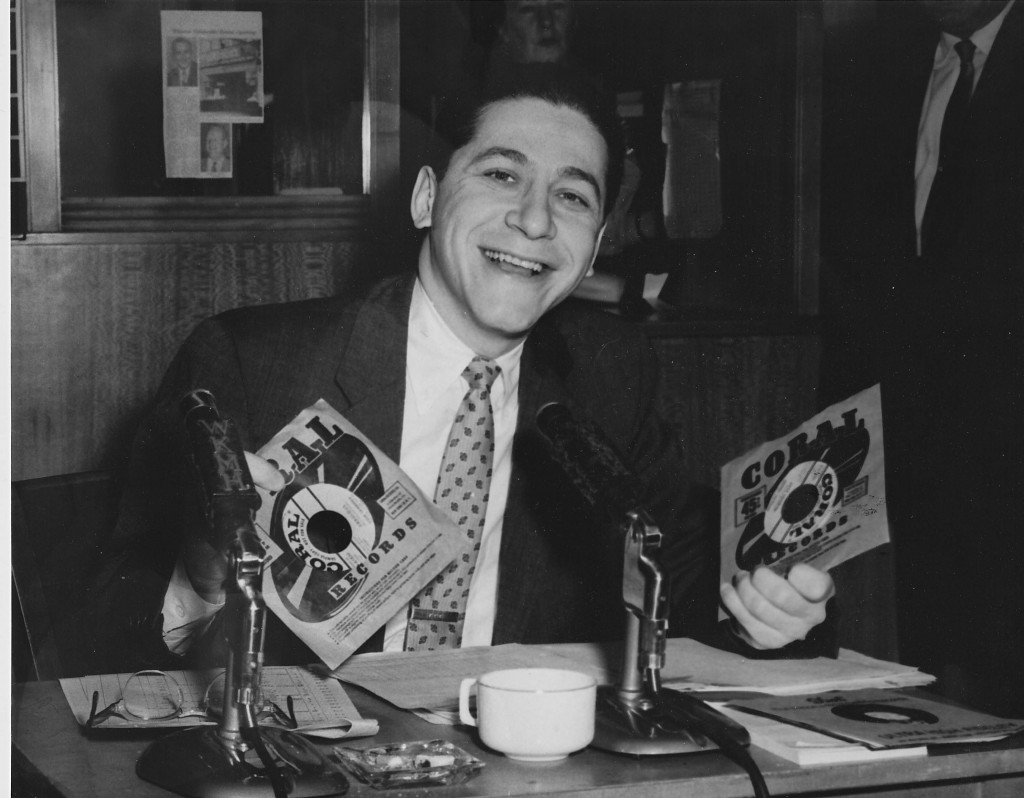

![]()
 From the MCRFB RADIO NOTEBOOK: 1957, 1959, 1961 and 1962
From the MCRFB RADIO NOTEBOOK: 1957, 1959, 1961 and 1962
WKMH-AM
DETROIT (October 28, 1957) — DETROIT DISK BIZ SLOW: Echoing a national complaint of recording distributors in the industry, Robin Seymour, deejay-program director of WKMH, Detroit, reports that in recent weeks the best selling lists around the Motor City has been static, with fewer and fewer new records making their way onto the charts. Seymour opined that that poor economic conditions locally are to blame, but added the optimistic prediction that things should change soon, since Detroit record sales during fall and Christmas have topped each previous year for the past several holiday yule seasons. END.
DETROIT (July 20, 1959) — Robin Seymour, WKMH, Detroit, has launched a daily 15-minute segment (6:15 – 6:30 p.m.) featuring musical highlights from a different year each day, along with commentary about news events of each date. The segment is produced by Arlene Schubert, who is currently the Dearborn-based WKMH music librarian. END.
DETROIT (August 28, 1961) — Two new jocks have joined WKMH, Detroit. Bob Green, formerly with WGVA, Geneva, New York, has moved into the 8-10:45 p.m. time slot on WKMH. Ray Otis, ex-WHK, Cleveland, has taken over the outlet’s 12 noon to 3:00 p.m. across the-board-time slot and its Sunday noon to 4:00 p.m. time-frame. Bob Green will also act as WKMH’s production director. END.
DETROIT (September 11, 1961) — Plans are now on the drawing boards for deejay record hops to be run direct by local arenas, with evening jocks doing their shows direct from the spot and featuring guest recording talents. Records by the artists would be available for purchase as well by recording distributors’ rack-jobbers. The idea of deejay broadcasts from rink locations is not new. Only in recent weeks, Lee Alan, WKMH, Detroit, staged a successful teen dance at the Riverside Roller Arena in that city with such acts as Bob Beckham, Little Caesar and the Romans, also the Marvelettes and the Edsels present. END.
DETROIT (March 10, 1962) — A flock of stations around the country last August supported city drives to encourage teenagers to return to high school and reduce “drop-outs” which result when youngsters find summer employment and don’t want to go back to school in the fall. For example, Dave Prince, WKMH in Detroit, sponsored a “back to school” contest, asking teenagers to complete in 25 words or less the statement: “I’m going back to school this fall because . . . ” Winners received wrist watches and transistor radios. The response was so great that the Michigan Education Association plans to stage similar contests next year with WKMH and other Michigan radio stations. END.
DETROIT (March 31, 1962) — (Billboard Programming Panel) — Question: “Do you have special promotions or programming ideas which are designed to build better relationships with local schools and students?”
(Dave Prince, WKMH, Detroit) — ANSWER:
“Station WKMH deejays lead yells at the high schools each fall. We have our own WKMH cheerleader sweaters, megaphones, and a special series of school chants and yells, using the deejays’ names, station call-letters, etc. I also sponsor a “Back To School” contest at the radio station during the fall in co-operation with the Michigan Education Association, giving away 10 wrist watches to the best ten letters. The MEA will incorporate the idea throughout Michigan next fall.” END.
___
A MCRFB Note: Information and news source: Billboard Magazine. All excerpts culled as was first published from the dated editions as noted above.

![]()
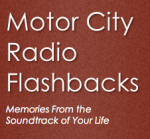 From the MCRFB news archive: 1963
From the MCRFB news archive: 1963
NEW NBC RADIO VICE PRESIDENT POST WILL BE TOUGH ASSIGNMENT FOR MIKE JOSEPH
NEW YORK — Broadcasters did double-takes last week upon hearing of the appointment of Mike Joseph, former program consultant, to the newly-created post of vice-president, NBC-owned radio stations.
Joseph, long-associated with what is usually called swingin’ pop-music formatted stations, will be taking over the reins of one of the nation’s richest and most unsuccessful group of radio station operations owned by the network.

At this juncture Joseph’s duties have not been spelled out. No matter what his duties, he will have his work cut out for him.
The six NBC-owned radio stations are perhaps — as a group — one of the best examples of a low audience appeal approach to broadcasting.
Bottom Of Heap
A thumbnail analysis of each station’s market position reveals the following:
WNBC, New York (50,000 watts): 10th place. One service gives it sixth position 7 a.m. to noon, and 11th, noon to 6 p.m.
WMAQ, Chicago (50,000 watts): Tied for fifth place, 6 a.m. to 6 p.m. From 6 p.m. to midnight, ninth. Another service is much kinder, rating the station third in the morning and fourth in the afternoon.
KNBR, San Francisco (50,000 watts): Tied for fifth place in the morning and seventh in the afternoon. Another service rates it sixth in the a.m. and eighth in the p.m.
WRC, Washington D. C. (5,000 watts): Eighth place out of nine stations listed.
WRC, Washington D. C. (5,000 watts): Fourth in mornings and sixth in the afternoon and evening. This outlet tops all others in the NBC chain achieving first place in the morning and third in the afternoon on one rating service.
WJAS, Pittsburgh (5,000 watts): Tied for last place morning and night; last place in afternoons.
It is highly unlikely that four of the six stations could stand on their own financially without being carried by mother flagship network NBC.
Industry observers attribute the sorrowful rating picture of the NBC-owned radio stations mainly due to the fact that they are satellites for the financially successful NBC radio network. The family stations must carry all of the network’s programming, including the full load of “Monitor” Saturdays and Sundays no matter the effect on rating. Affiliates have a choice of scheduling and percentage of net shows carried.
What little there is left for the beleaguered six stations to program on their own is dictated from the sixth floor of 30 Rockefeller Plaza where the attitude had been: close down before playing rock and roll, no editorializing, no promotion, etc. The top echelon of NBC has persuaded itself that it is more in the public interest to sacrifice popularity and listeners for image. Apparently the image is fading as quickly as the listener audience in general, translating in poor ratings overall.
In sharp contrast to the NBC operation is the highly successful, aggressive, and modern, ABC-owned radio stations headed by Harold Neil. Each of the ABC stations are for the most part, operated independently with local management calling the shots as to how best serve their immediate communities. ABC places few taboos on their stations.
ABC advertising and promotion in behalf of its owned radio stations has been brilliant and outstanding. CBS has also followed a course of promoting their stations through ads in the consumer and trade press. Although there is a proliferation of other NBC advertising, promotion of its owned radio stations is a rarity.
Speculation has it that no vice-president — however talented and capable as Mike Joseph is successfully known for his brilliant approach in various radio consultations and changes he implemented during the course of this year alone — will be able to solve the dilemma of the NBC-owned radio stations without a complete change of thinking and approach by the two men who are presently calling the shots for NBC radio, Robert Kintner and Robert Sarnoff. END
___
(Information and news source: Billboard; December 28, 1963)
![]()